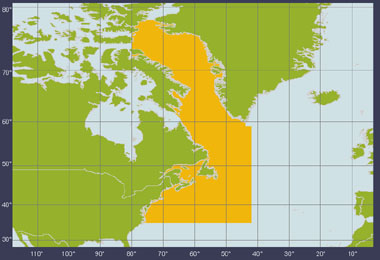 | Mandate |  | |
The Northwest Atlantic Fisheries Organization (NAFO) is an inter-governmental fishery science and management body founded in 1979 as successor to ICNAF (International Commission for the Northwest Atlantic Fisheries) (1949 to 1978). NAFO's overall objective consists in contributing through consultation and cooperation to the optimum utilization, rational management and conservation of the fishery resources of the Convention Area. The NAFO Convention on Future Multilateral Cooperation in the Northwest Atlantic Fisheries applies to most fishery resources of the Northwest Atlantic (except salmon, tunas/marlins, whales, and sedentary species [e.g. shellfish). In 2005, NAFO has 13 Members (EU counting as one member) from Central and North America, Europe, and Asia.  | Approaches |  | |
NAFO's Conservation and Enforcement Measures are updated annually by the Fisheries Commission and are based on scientific advice from the Scientific Council. In 2005, NAFO has started to implement the Precautionary Approach. Some important regulations regarding the management, control and monitoring of NAFO's fishery resources are: - Total Allowable Catches (TACs) and quotas (including multi-year-management plans)
- By-catch, fishing gear, fish sizes requirements and closed areas and seasons
- Inspections at sea and at port
- Vessel Monitoring System (VMS) and independent observers on each vessel
- Product Labelling Requirements
- Authorization to fish, vessel requirements, vessel register and chartering arrangements
- Recording, reporting and communication of catches
- Scheme to promote compliance by non-Contracting Parties vessels including IUU vessel list.
|
The NAFO Scientific Council acts upon a formal request for information by NAFO Fisheries Commission or a NAFO Coastal State. The Fisheries Commission, for example, routinely asks the SC to assess the status of commercial fish species in the Convention Area.
Each NAFO member is obliged to make available all statistical and scientific information related to such requests. The Scientific Council encourages and promotes coordinated international surveys and investigations in the NAFO Convention Area that are related to the requests for information received. It organizes several meetings per year where scientists from NAFO Member States present and discuss findings from these activities. In its work, the Scientific Council takes into account environmental and ecological factors affecting the NAFO fisheries. The results (stock and environmental assessments) are published in the NAFO Scientific Council Reports and are presented to the Fisheries Commission at the NAFO Annual Meeting.
In addition to the advice upon request, the Scientific Council organizes workshops and symposia that are open to the scientific public worldwide. The most prominent scientific publication of NAFO is the Journal of Northwest Atlantic Fishery Science ( ). ). |
 | Area of Competence |  | |
Atlantic Northwest
NAFO competence area
|
 | Topic coverage |  | |
 | Legal Framework |  | |
Established by the Convention on Future Multilateral Cooperation in the Northwest Atlantic Fisheries, concluded at Ottawa, Canada, on 24 October 1978 and entered into force on 1 January 1979.
 |
| 









